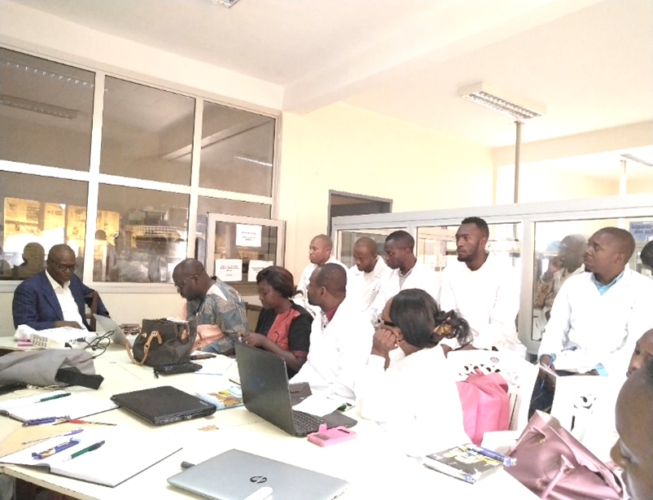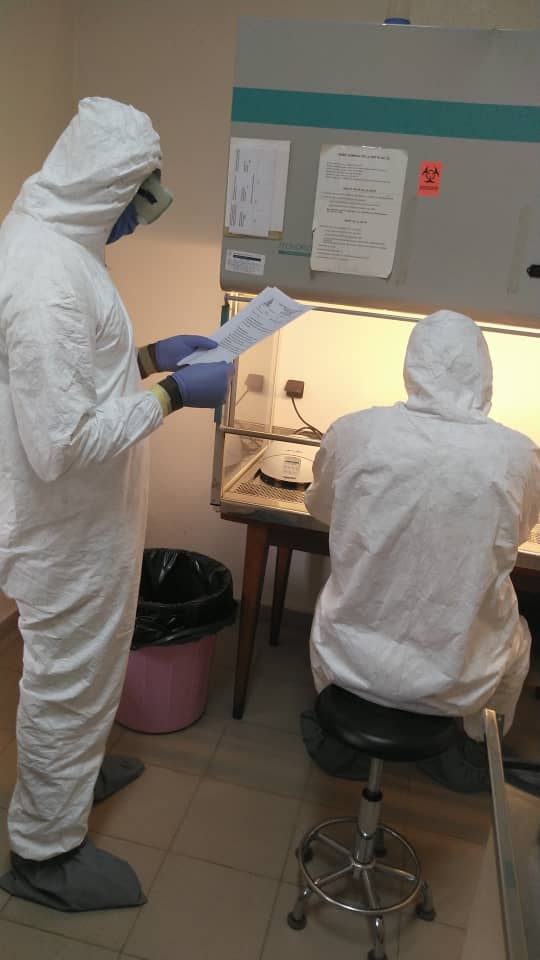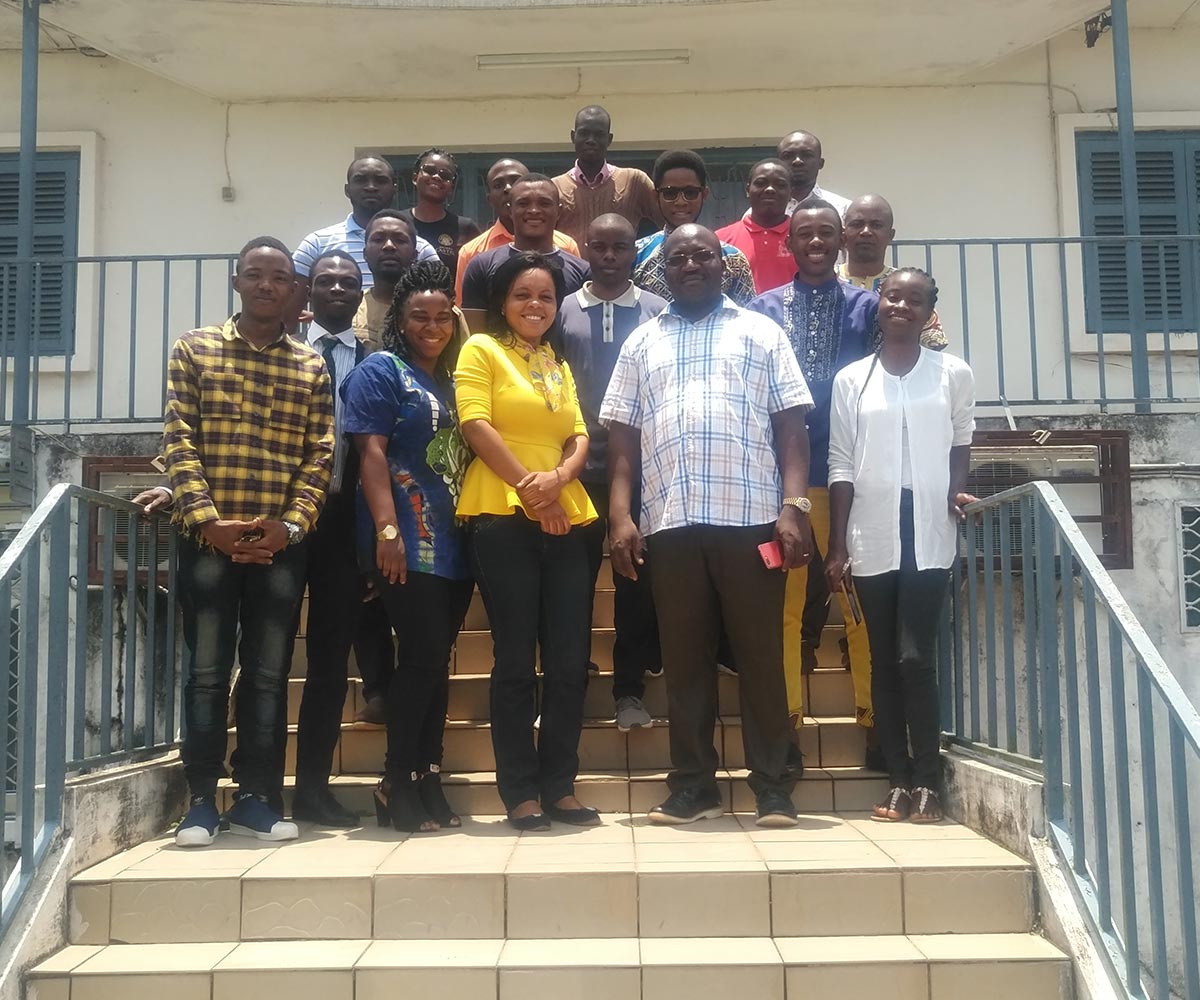DEPARTMENTS
RESEARCH
LE LABORATOIRE DE RECHERCHE EN SANTÉ PUBLIQUE BIOTECHNOLOGIES (LAPHER-BIOTEC) Fondée en 1998 par le Professeur Mbacham Wilfred, comme partie intégrante du Centre de Biotechnologie (CTB) de l’Université de Yaoundé I et dans le prolongement du groupe de Parasitologie Moléculaire initié par le Prof. VPK Titanji. LAPHER a été financé par au moins trois des projets du Professeur Mbacham parmi lequel le Projet PRD college du (2005 – 2009).
Le projet The Malaria Research Capacity Development Consortium (MARCAD) est l’un des projets du Professeur Mbacham actuellement qui contribue grandement au CBT.


The LAPHER-Biotech
The Laboratory of Public Health Research Biotechnologies is one of the seven laboratories situated in the BioTechnology Center (BTC), which accommodates several research Units. The laboratory comprises five main units, each with specific objectives:





1. The Molecular Biology & Biochemistry Unit
The Biochemistry Unit, as part of the Molecular Biology & Biochemistry Unit, specializes in studying the chemical processes and reactions that occur within living organisms. They delve into the intricate details of biological molecules and their interactions, aiming to uncover the fundamental principles governing life at a molecular level. By investigating the biochemical basis of diseases, this unit plays a crucial role in identifying potential targets for therapeutic interventions and developing novel treatments.
1. Molecular Biology & Biochemistry Unit
1. The Molecular Biology Unit investigates the genetic and molecular mechanisms underlying diseases. They focus on understanding how these mechanisms contribute to the development and progression of various illnesses. Their research helps in the development of diagnostic tools based on molecular markers and contributes to advancements in personalized medicine. They also do the Detection of biomarkers in non- communicable and communicable diseases. Also They do Research in neglected areas of human health
2. Data Management and Disease Modelling Unit
• The Data Management and disease Modelling Unit plays a vital role in collecting, storing, and analyzing health-related data. They collaborate with other research units to ensure the accuracy and reliability of the data.

Service 1
By developing data management protocols and tools, they contribute to efficient analysis and facilitate evidence-based decision-making

Service 2
• They also plays a vital role in Training students in data analysis techniques

Service 3
• They carry out modeling of diseases to understand disease burden and trends
3. The Drug Safety & Clinical Trial Unit
•The Drug Safety & Clinical Trial Unit is responsible for evaluating the safety profiles of drugs through preclinical and clinical trials.

Service 1
They closely monitor and report any adverse drug reactions, ensuring that the medications used are safe and effective

Service 2
•They also plays a vital role in monitoring resistance markers to drugs

Service 3
•They Collaborate with healthcare professionals and regulatory agencies to ensure the responsible and safe use of drugs
4. Food Safety Unit
The Food & Drug Safety Unit is responsible for monitoring and evaluating the safety standards of food and drugs.

Service 1
They conduct research to understand the impact of regulations on public health and develop innovative methods for detecting contaminants in food and drugs.

Service 2
Their work ensures that the products consumed by the public are safe and meet the necessary quality standards.

Service 3
They also focus on the Characterization of zoonotic agents and conditions caused by antibiotics and probiotics. They also contribute to food production, biopharmaceuticals and the discovery of peptides
5. Production Centre & Reagent Development Unit:

Service 1
The Production Centre and Reagent Development Unit focuses on the development of bio-reagents

Service 2
·
Productionof primers for various applications

Service 3
· Additionally, they collaborate with other research institutions to share reagents and resources, fostering a spirit of cooperation and knowledge exchange
VISION
Dans une perspective visionnaire de chef du laboratoire Prof. Mbacham, l’approche adoptée vise à renforcer la capacité de recherche en réorientant les talents individuels grâce à une formation personnalisée et à l’amélioration des compétences de base. L’objectif est de créer un environnement propice à l’épanouissement des chercheurs, en leur offrant les ressources et les opportunités nécessaires pour développer leur expertise et contribuer de manière significative à la recherche scientifique.
MISSION
La mission de LAPHER-Biotech est de promouvoir des chercheurs regroupés dans des pôles d’excellence, capables d’initier et de mener des recherches de qualité visant à améliorer la santé et le bien-être des humains. En encourageant la collaboration et l’échange d’idées au sein de ces pôles, l’objectif est de favoriser l’innovation et de générer des avancées significatives dans le domaine de la santé publique. Grâce à ces efforts conjoints, il est espéré que des solutions novatrices seront découvertes, contribuant ainsi à l’amélioration de la qualité de vie de la population
Take Home Message
Dans l’ensemble, le Laboratoire de Recherche en Santé Publique Biotechnologies comprend ces unités, chacune ayant son domaine d’expertise et son objectif spécifique. Ensemble, elles contribuent à l’avancement de la recherche en santé publique, garantissant la sécurité et le bien-être de la population grâce à leurs efforts scientifiques. Le laboratoire est financé par les projets du Professeur Mbacham et de ses membres d’équipe.
© 2022 All Rights Reserved.
